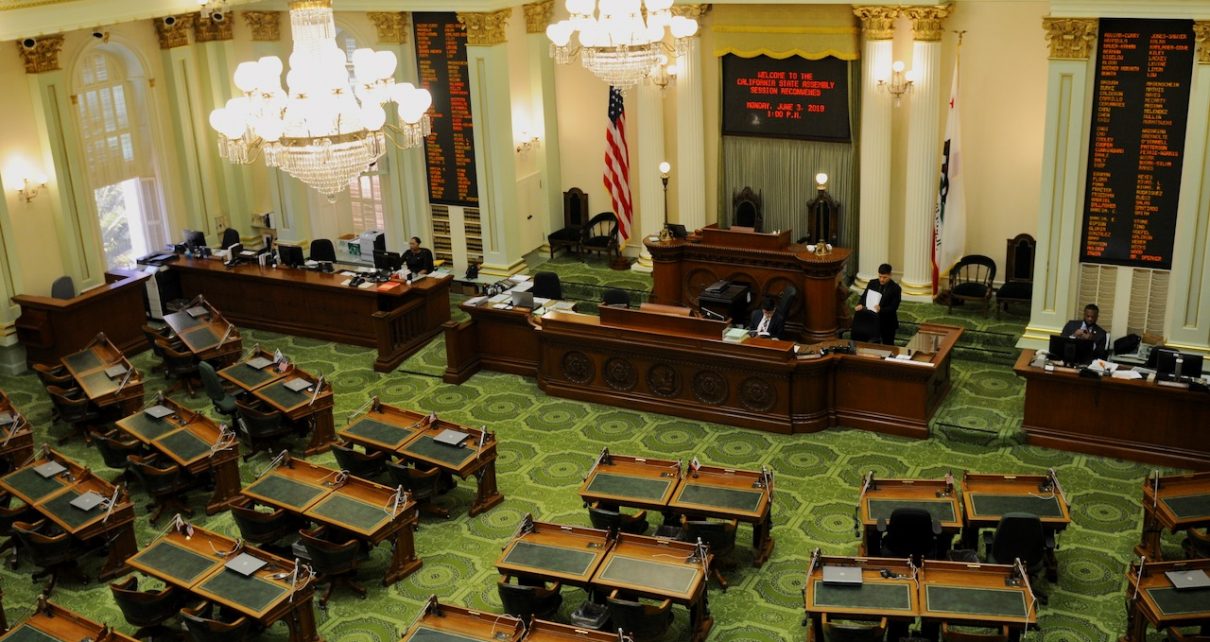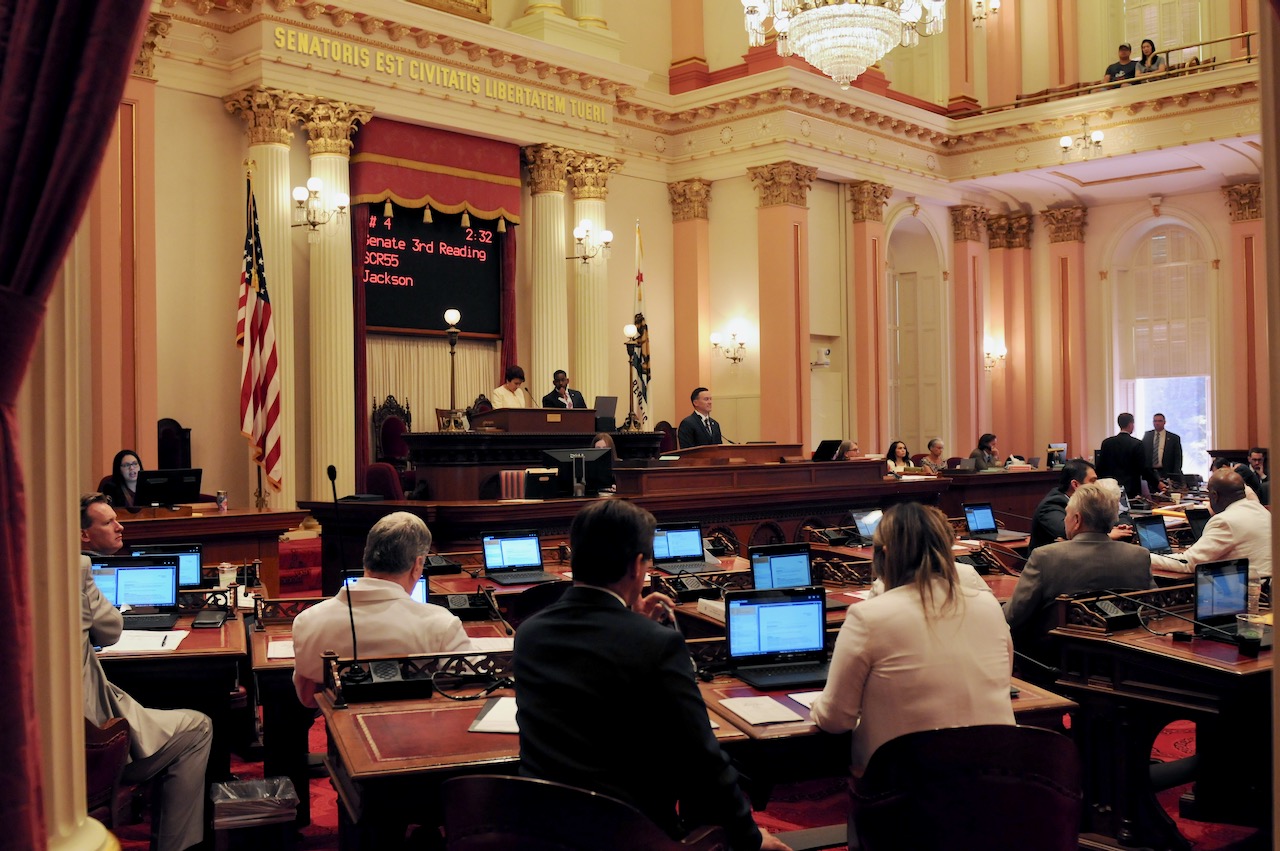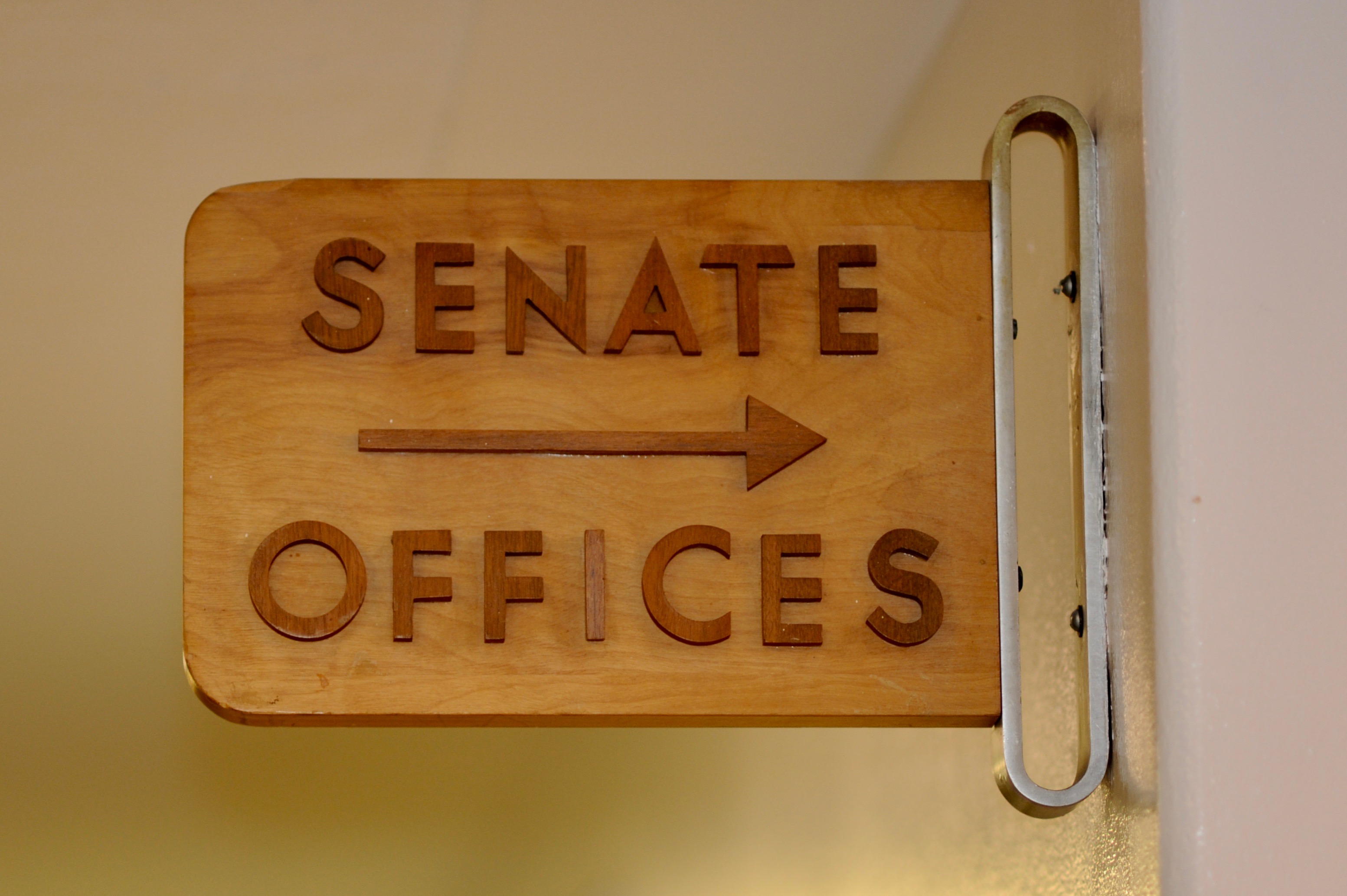
California State Assembly. (Photo: Kevin Sanders for California Globe)
Key Provisions of the Legislature’s Internal Rules – The Joint Rules – Part IV
The Joint Rules Committee includes members of the two Rules Committees, as well as legislative leaders in both houses
By Chris Micheli, April 15, 2020 6:31 am
This is Part lV of Key Provisions of the Legislature’s Internal Rules – The Joint Rules – Part lll is here. Part ll is here. Part I is here.
Study or Audits – Joint Legislative Audit Committee establishes priorities and assigns work to be done by the Bureau of State Audits. A bill requiring action by the BSA must contain an appropriation for that cost. A resolution calling for a BSA study or audit must be referred to the rules committee. An estimate from JLAC must be obtained. (37.4)
Waiver – The requirement of an appropriation for the cost of a BSA study or audit can be waived and, if the cost is less than $100,000, the chair of JLAC may waive it. (37.5)
Administrative Regulations – Any Member may request the Senate Rules Committee or the Assembly Speaker to direct a standing committee or the Office of Research to study any proposed or existing regulation. Upon receipt of the request, a determination is made whether to undertake the study. The study may consider whether the regulation (1) Exceeds the agency’s statutory authority; (2) Fails to conform to the legislative intent of the enabling statute; (3) Contradicts or duplicates other regulations adopted by federal, state, or local agencies; (4) Involves an excessive delegation of regulatory authority to a particular state agency; (5) Unfairly burdens particular elements of the public; (6) Imposes social or economic costs that outweigh its intended benefits to the public; and, (7) Imposes unreasonable penalties for violation. The reviewing unit transmits its concerns to the Assembly Speaker, Senate Rules Committee, and the promulgating agency. A report may include a recommendation that the Legislature adopt a concurrent resolution requesting the state agency to consider its action or that the Legislature enact a statute to restrict the regulatory powers of the state agency. (39)
Joint Rules Committee – The Joint Rules Committee is created and has a continuing existence during session and any recess and includes members of the two Rules Committees, as well as legislative leaders in both houses. The joint committee is charged with the relationship between the two houses and procedures, the legislative branch of government, legislation, operation of the Legislature and its committees, aides to the Legislature, and information and statistics. It can allocate space in the Capitol Building, approve Legislative Counsel in litigation, contract with other agencies for services, appoint a chief administration officer, appoint chairs of joint committees, and other duties. (40)
Review of Administrative Regulations – The Joint Rules Committee must approve any request for a priority review made by a committee pursuant to the Government Code and must submit approved requests to the Office of Administrative Law. (40.1)
Subcommittee on Legislative Space and Facilities – A Subcommittee on Legislative Space and Facilities is created under the Joint Rules Committee which three members from each house. The subcommittee must consider the housing of the Legislature and legislative facilities, and can contract for services, work with local government, etc. (40.3)
Claims for Workers’ Compensation – The Rules Committee Chair of each house must sign any required workers’ compensation report regarding any injuries arising out of the court of employment of any Member, officer or employee of either house or committee. (41)
Information Concerning Committees – Rules Committee of each house must provide for a continuous accumulation of information regarding legislative investigating committees and this information is available to the public and is published periodically. (42)
Joint Committees – Any concurrent resolution creating a joint committee or allocating moneys must be referred to the Rules Committee of each house. (43)
Conflict of Interest – While serving, Members of the Legislature may not have any financial or other interest, direct or indirect, and may not engage in any business or transaction or professional activity, or incur any obligation of any nature, that is in substantial conflict with the proper discharge of his or her duties in the public interest and his or her responsibilities as described by state laws. Members during his or her term may not accept other employment that will impair his or her independent judgment regarding official duties; to disclose confidential information; willfully and knowingly disclose for gain any confidential information acquired in the course of official duties, accept any employment, fee or thing of value for appearing or taking any other action on behalf of another person regarding a licensing or regulatory matter before any state board or agency. This rule does not prohibit a Member who is an attorney from practicing before the Workers’ Compensation Appeals Board or the Commissioner of Corporations, or any matter before any state board or agency to a state or federal court proceeding. This rule does not prohibit a Member from making an inquiry for information on behalf of a constituent before a state board or agency if no fee or reward is given or promised. This rule does not apply to a partnership of which a Member is a member if he or she does not share in the fee. A Member cannot receive any compensation or gift for any service, advice, or assistance related to the legislative process, except for fees for speeches or published works on legislative subjects and for reimbursement of expenses for actual travel and subsistence for which the State of California does not make payment. A Member cannot participate on the floor or in committee in the enactment or defeat of legislation in which he or she has personal interest, except in specified instances provided in this rule. This rule also specifies when a Member does or does not have an interest that is in substantial conflict with the proper discharge of his or her duties in the public interest. A conflict is not created solely by reasons of a relationship to any potential beneficiary that is defined as “remote interest” under the Government Code or because he or she received a campaign contribution, so long as the campaign contribution is not made in violation of the law and does not influence the Member’s vote or action. A person may not induce any Member of the Legislature to violate any part of this rule. (44)
Ethics Committees – The Senate Legislative Ethics Committee and the Assembly Legislative Ethics Committee received complaints concerning Members of their respective houses and may investigate and make findings and recommendations concerning any violations of the Government. Each house adopts its own rules for the establishment and procedures of its ethics committee. (45)
Designating Legislative Sessions – Regular sessions are identified with the odd-numbered year subsequent to each general election with a hyphen and then the last two digits of the following even-numbered year. (50)
Designating Extraordinary Sessions – All extraordinary sessions are designated in numerical order by the session in which it is convened. (50.3)
Days and Dates – Day means a calendar day and when a deadline or recess falls on a Saturday, Sunday or Monday that is a holiday, then the date is the preceding Friday. (50.5)
Legislative Calendar – This rule specifies when the Legislature observes the calendar during the first year of the regular session, including the Organizational Recess, Spring Recess, Summer Recess, and Interim Study Recess. The Legislature observes the following calendar for the remainder of the legislative session: Spring Recess, Summer Recess, and Final Recess. The recesses specified by this rule shall be designated as joint recesses. (51)
Recall from Recess – The Legislature may be recalled from joint recess and reconvene in regulation session by joint proclamation of the Senate Rules Committee and Assembly Speaker; ten or more Members of the Legislature may present a request for recall to the Assembly Chief Clerk and Senate Secretary. Within 10 days, the Assembly Speaker and Senate Rules Committee must act upon the request. If they concur, they must issue a joint proclamation to recall the Legislature from joint recess. (52)
Procedure on Suspending Rules by Single House – When the rules authorize suspension of a Joint Rule regarding a particular bill by action of a single house after Rules Committee approval, then a written request to suspend the joint rule must be filed with the Assembly Chief Clerk or the Senate Secretary and transmitted to the Rules Committee of the appropriate house. The Rules Committee then determines whether an urgent need exists for suspending the joint rule for a bill. If the Rules Committee recommends the suspension of the rule, the Member may offer a resolution to grant permission to suspend the rule. (53)
- A Historic Look at Bill Introductions in the California Legislature - February 21, 2026
- Construction of Eminent Domain Law - February 21, 2026
- Deposition of Expert Witnesses - February 20, 2026




